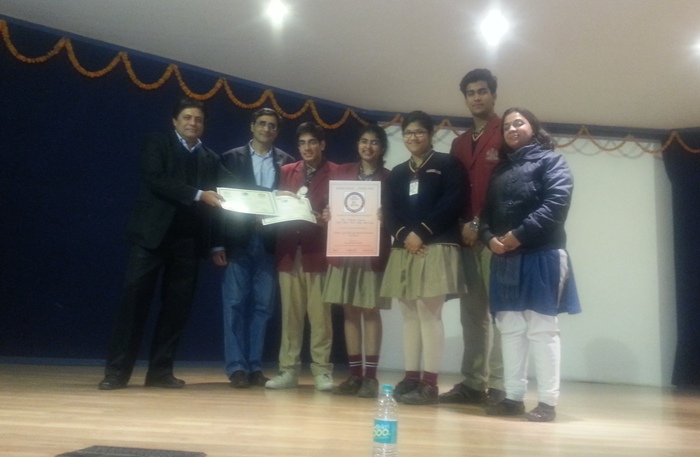CPR Training and Peer Educators Convocation Ceremony
On the 28 January, 2014, the Peer Educators of our School, namely Surbhi Bhatt, Apaar Bharadwaj, Karan Kalra, Hema Chakraborty and Pranati Haldia along with School Counsellor, Ms. Sukhmeen Cheema went to the National Science Centre to attend the convocation ceremony of the Peer Education Programme. This programme had hugely enlightened us on diverse social issues. So the thought this being the crowing session, as it were, made our anticipation high.
As always, the gathering of successful peer educators from different schools was welcomed by Dr. Jitendra Nagpal, who began the session with a very encouraging speech. This was followed by an open-house discussion where students were asked to share their experiences. What they had learnt in their year-long association with this recognized programme and what use they made of the knowledge they had acquired.
The program proceeded with Dr. Junejas session, who briefed us about the topic of the session which was CPR or Cardiopulmonary Resuscitation. Initially, he gave us some vital information on what is first-aid and what should be done in case of a medical emergency in to stabilize the situation before professional medical help arrives. A team of doctors from Medanta, the multi-speciality medical institute, then supplemented our knowledge on how to carry out first-aid for the most common problems people face. They informed us that fainting occurs due to a temporary reduction of blood flow to the brain, and can be confirmed if the patient is sweating, has a slow pulse and has cold, pale skin. In the case of a fainting episode, the victim should be made to lie down with the legs raised. In the case of a bee-sting, the sting should be first removed as soon as possible. The poison sac should not be squeezed, and cold compressions should be given in the area to reduce pain. If a person chokes, he/she should be encouraged to cough. 5 sharp slaps on the back should be given along with abdominal thrusts. If a person suffers a nosebleed, he/she should be made to lie with their legs raised and nostrils squeezed. The head should be brought forward and clots should be encouraged to flow out so that they dont obstruct the wind-pipe. In case a person gets a fits, he/ she should be made to lie down. The chest clothing should be loosened and the chin should be lifted up. A folded handkerchief should be placed in between the teeth to prevent a tongue bite.
We were also told that BLS or Basic Life Support is what one does to revive a person who has fainted and stopped breathing. It has a cycle of thirty chest compressions followed by two artificial breaths. This cycle is to be repeated five times and continued if the person does not revive. The session was made even more enlightening as well as interesting when the students were asked to perform CPR on dummies themselves.
The convocation was the most awaited moment when all the schools were rewarded with certificates for their participation and contribution in making the Peer Education Programme a success. It was hoped that they would carry this legacy forward. We were elated on receiving our certificates as it was now evident that we had formally become Master Peer- Educators. It might be the end of only a year-long association but what is more important is that we have developed into more vigilant citizens who will now scatter like seeds only to grow into new saplings; to spread the ideals for which this programme came into existence.
Surbhi Bhatt- 11
Hema Chakraborty- 11
Pranati Haldi -9













